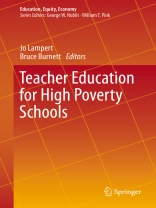This volume captures the innovative, theory-based, and grounded work being done by established scholars who are interrogating how teacher education can prepare teachers to work in challenging and diverse high-poverty settings. It offers articles from the US, Australia, Canada, the UK and Chile by some of the most significant scholars in the field. Internationally, research suggests that effective teachers for high poverty schools require deep theoretical understanding as well as the capacity to function across three well-substantiated areas: deep content knowledge, well-tuned pedagogical skills, and demonstrated attributes that prove their understanding and commitment to social justice. Schools in low socioeconomic communities need quality teachers most, however, they are often staffed by the least experienced and least prepared teachers. The chapters in this volume examine how pre-service teachers are taught to understand the social contexts of education. Drawing on the individual expertise of the authors, the topics covered include unpacking poverty for pre-service teachers, issues related to urban schooling as well as remote and regional area schooling.
Inhaltsverzeichnis
Introduction by Jo Lampert and Bruce Burnett.- Preparing Teachers for Diversity and High-Poverty Schools: A Research-based Perspective By Marilyn Cochran-Smith and Ana Maria Villegas.- “American Hunger”: Challenging Epistemic Injustice through Collaborative Teacher Inquiry by Gerald Campano, María Paula Ghiso, Robert Le Blanc, and Lenny Sánchez.- Difficult Dialogues about Race and Poverty in Teacher Preparation by Tyrone C. Howard and Andrea Rodriguez-Scheel.- Teacher Education for High-Poverty Schools in Australia: The National Exceptional Teachers for Disadvantaged Schools Program by Bruce Burnett and Jo Lampert.- More Aboriginal and Torres Strait Islander Teachers for Australian High-Needs Schools by Kaye Price.- Teacher Professional Development in a Complex and Changing World: Lessons Learned From Model Teacher Education Programs in Transnational Contexts by Arnetha F. Ball.- You Teach Who You Are: The Experiences and Pedagogies of Literacy/English Teacher Educators Who Have a Critical Stance by Clare Kosnik, Pooja Dharamshi, Lydia Menna, Cathy Miyata, and Yiola Cleovoulou.- Poverty, Schooling, and Beginning Teachers Who Make a Difference: A Case Study From England by Joanna Mc Intyre and Pat Thomson.- Preparing Teachers for Social Justice in the Context of Education Policies that Deepen Class Segregation in Schools: The Case of Chile by Christine Sleeter, Carmen Montecinos, and Felipe Jiménez.- Literacy Teacher Research in High-Poverty Schools: Why it Matters by Barbara Comber and Annette Woods.- Teachers’ Work in High-Poverty Contexts: Curating Repertoires of Pedagogical Practice by Deb Hayes.- Learning to Teach in the Park: The York University Regent Park Initiative by Alison Griffith and Sherri Gilbert.- “Just Don’t Get Up There and ‘Dangerous Minds’ Us”: Taking an Inquiry Stance on Adolescents’ Literacy Practices in Urban Teacher Education by Rob Simon.












